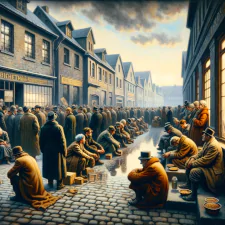Eradicating Ideas By Burning Books:
The Nazi Party engaged in widespread book burning. As part of their oppressive control mechanisms and propaganda strategies. The imagery of books being thrown into the flames created a powerful message of control and fear. A narrative of total dominance and complete humiliation. Their objectives were multifaceted and aimed at consolidating power and molding German society according to their belief system.
Key Takeaways
- Propaganda Tool: Book burnings were a powerful propaganda tool, symbolizing the rejection of dissent and the dominance of Nazi ideology.
- Intellectual Suppression: The destruction of books aimed to suppress intellectual freedom and promote a homogenized cultural narrative.
- Symbolic Power: The use of fire in public book burnings served as a potent symbol of purification and control.
Table of Contents
- What Does Eradicate Mean?
- Evil Wins When Good Men Do Nothing?
- Germany After WWI
- How Did The Treaty of Versailles Affect Germany Economically?
- Hyperinflation in Germany
- Nazis Rise the Final Nail
- The Desperation of the German People leads to Book Burning.
- Extreme Economic Hardship on German Citizens:
- The Effect of Unemployment and Poverty on German Families:
- The Rise of Social Unrest and German Political Extremism:
- Loss of Faith in Traditional German Institutions:
- Psychological Impact of War and Defeat on the German People:
- Cultural Despair Germans Lose Identity:
- German Farmer's Rural Suffering:
- Wars' Impact on German Families:
- Political Instability and Social Unrest in Germany
- Rise of German Nationalism and Anti-Semitism:
- Acceptance of Nazi Policies:
- Germany Has Their Enemy the Jewish People
- What Were Nazi Book Burning Objectives?
- Erasure of Jewish Intellectualism:
- Book Burning: Elimination of Dissenting Voices
- Propaganda Control Over Cultural and Intellectual Content:
- Book Burning Propaganda and Psychological Warfare:
- Undermining Marxist and Communist Texts:
- Book Burning to Control of Educational Material:
- Propaganda Attacks on LGBTQ+ Works:
- Final Thought On The Propaganda of Book Burning:
- Frequently Asked Questions
- What was the purpose of Nazi book burnings?
- How were book burnings used as propaganda by the Nazis?
- What impact did Nazi book burnings have on intellectual and cultural life?
- Why was fire symbolically important in Nazi book burnings?
- What was the broader social and psychological impact of Nazi book burnings?
What Does Eradicate Mean?
To “eradicate” means to completely remove or destroy something.
Evil Wins When Good Men Do Nothing?
To understand why Germany allowed the events leading up to World War II, consider the psychological impact and symbolic power of actions like book burnings, which unified people through shared imagery of destroying the “enemy’s” ideas.
The economic hardship and social unrest post-World War I created fertile ground for such extreme measures, as the nation sought scapegoats for its problems. This context helps explain how a society could collectively support or accept the rise of oppressive measures against their fellow citizens.
Germany After WWI
How Did The Treaty of Versailles Affect Germany?
After World War I, Germany faced several severe economic conditions, which were largely a consequence of the war and the Treaty of Versailles. It’s key to understand the forces and extreme events that drove a nation to accept the path their leader placed them on. Here are some key aspects that shed light on the desperation of a people:
- Reparations and War Debts: The Treaty of Versailles imposed heavy reparations on Germany, demanding large payments in money and kind to the Allied countries. This financial burden strained the already weakened German economy.
- Hyperinflation: In the early 1920s, Germany experienced one of the most extreme cases of hyperinflation in history. This was partly due to the government printing money to pay war debts and reparations, which drastically reduced the value of the German Mark.
- Economic Instability: The war left Germany’s economy destabilized. Industrial and agricultural production had been disrupted, leading to shortages and economic disarray. Many skilled workers and soldiers had died or were incapacitated, further impacting productivity.
- Unemployment and Social Unrest: High levels of unemployment and poverty led to widespread social unrest and political upheaval. This was exacerbated by the global economic downturn in the late 1920s and early 1930s.
How Did The Treaty of Versailles Affect Germany Economically?

Berlin, Germany. After the 1929 Stock Market Crash.
The Treaty of Versailles had a profound economic impact on Germany. It required Germany to pay huge war reparations, which strained its economy. The treaty also stripped Germany of valuable territories and resources, further weakening its economic position.
Additionally, the military restrictions imposed reduced the potential for defense-related industries, contributing to unemployment and economic instability. These factors led to hyperinflation and significantly contributed to the economic hardships faced by Germans in the post-war years.
Hyperinflation in Germany
- Foreign Loans and Investments: To stabilize its economy, Germany relied heavily on foreign loans and investments, particularly from the United States. However, this made the German economy vulnerable to external economic pressures.
- The Dawes Plan and the Young Plan: These were efforts to restructure German reparations and stabilize the economy. The Dawes Plan (1924) helped to stabilize the currency, and the Young Plan (1929) reduced the total amount of reparations.
- Industrial Recovery and Technological Advancements: Despite these challenges, the 1920s also saw some economic recovery and technological advancements in Germany, particularly in industries like chemicals and engineering.
Nazis Rise the Final Nail
The Great Depression:
- The onset of the Great Depression in 1929 further devastated the German economy, leading to even higher unemployment and exacerbating political and social tensions.
- These economic conditions set the stage for the political and social upheavals that would follow in Germany, ultimately contributing to the rise of Adolf Hitler and the Nazi Party.

The Desperation of the German People leads to Book Burning.
The aftermath of World War I and during the 1920s and early 1930s was profound for the German people largely due to the severe:
- Economic Challenges
- Social Unrest
- Political crises
They faced. Let’s look at the factors contributing to this desperation:
Extreme Economic Hardship on German Citizens:
- The hyperinflation of the early 1920s
- Economic hardship
- Money became virtually worthless.
The Effect of Unemployment and Poverty on German Families:
With industries ravaged by the war and the global economic downturn of the Great Depression
- Unemployment soared
- Struggled to afford food and necessities
- Widespread poverty and hunger.
The Rise of Social Unrest and German Political Extremism:
The economic and social crises fueled political extremism. Both the far right (including the nascent Nazi Party) and the far left saw increases in support. Desperate people often turned to radical solutions. Street fights between different political factions became common.
Loss of Faith in Traditional German Institutions:
The failure of the Weimar Republic to effectively address these crises led to a loss of faith in traditional political institutions and democracy itself. Many felt betrayed by the government and the old elites, believing they had failed the nation.
Psychological Impact of War and Defeat on the German People:

The psychological impact of losing World War I, along with the harsh terms of the Treaty of Versailles, contributed to a sense of national humiliation and anger. This was exacerbated by the loss of territories and the perception of being unfairly treated by the international community.
Cultural Despair Germans Lose Identity:
Beyond economic and political factors, there was a sense of cultural despair and loss of direction in the post-war period. The war had shattered old values and beliefs, leaving a void that was filled by various ideologies, including extremist ones.
German Farmer’s Rural Suffering:
Rural areas, too, suffered greatly. Farmers struggled with falling prices for their produce and were often unable to pay their debts, leading to foreclosures and loss of land.
Wars’ Impact on German Families:
The family unit was strained, with many children suffering from malnutrition and lack of education, and women facing increased burdens, both as breadwinners and caretakers.
This desperation made the German population particularly susceptible to radical political ideologies, including Nazism, which promised to restore Germany’s economy, rebuild its national pride, and address the grievances of the various segments of society. The desperation of this period is a crucial factor in understanding the rise of Hitler and the onset of World War II.
Political Instability and Social Unrest in Germany

The Weimar Republic, established after World War I, was marked by political instability. Frequent changes in government, coupled with the lack of a strong democratic tradition, left many Germans disillusioned with their political system.
Extremist political parties, both on the left and right, gained traction among a populace searching for solutions to their dire situation. This instability was compounded by social unrest and public dissatisfaction, as many Germans felt humiliated by the defeat in World War I and the harsh terms of the Treaty of Versailles.
Rise of German Nationalism and Anti-Semitism:
In this climate of economic hardship and political instability, nationalist sentiments grew. Many Germans, seeking to restore their national pride and stability, became susceptible to extremist ideologies. Adolf Hitler and the Nazi Party capitalized on these sentiments, using effective propaganda to blame Germany’s woes on external and internal “enemies,” notably the Jews.
The Nazis propagated myths about Jewish control of finance and conspiracy against the German state, exacerbating existing anti-Semitic prejudices. We also see this in America with the rise of White Nationalism and Christian Nationalism targeting immigrants and Jewish-born Americans led by none other than the MAGA movement.
Acceptance of Nazi Policies:
The combination of economic desperation, social unrest, political instability, and deep-seated prejudices created a fertile ground for Nazi ideology to take root. As Hitler rose to power, his promises of economic revival, restoration of national pride, and the scapegoating of Jews resonated with many Germans who were desperate for change.
The gradual erosion of democratic institutions and the establishment of a totalitarian regime allowed the Nazis to implement increasingly radical policies, including the persecution of Jews. The widespread economic and social distress, along with the effective Nazi propaganda, meant that these policies were met with acceptance, indifference, or passive complicity by large segments of the German population.
Unfortunately, what the Republican party has been looking like over the last few years. Tearing at the fabric of our democratic institutions and targeting and blaming others for the issues we face in America today. Namely migrants and LBQTQ+
The dire economic and social conditions in post-World War I Germany, exacerbated by the Treaty of Versailles, created an environment in which Hitler’s ideologies and subsequent treatment of Jews could take hold.
This period in history serves as a stark reminder of how economic despair, political instability, and deep-seated prejudices can lead to the rise of extremist ideologies and the acceptance of inhumane policies.
Germany Has Their Enemy the Jewish People

Hiter and the Nazis party find a scapegoat and blame the Jewish community for all the problems the country faces. Now we can see the all forces at work and how the burning of books was designed to humiliate, dominate, exert control, and spread fear. More importantly, it was the erasure of an entire group of people.
What Were Nazi Book Burning Objectives?
Erasure of Jewish Intellectualism:
Propganda of Anti-Semitism:
- The Nazis aimed to eradicate Jewish influence, and burning books written by Jewish authors was part of this strategy.
Targeting Jewish Scholars Burn Books:
- Jewish scholars and intellectuals were particularly targeted to undermine their contributions to arts, science, and culture.
Book Burning: Elimination of Dissenting Voices
Suppression of Opposition:
- Books that opposed Nazi ideologies or were written by political opponents were destroyed to suppress counter-narratives.
Stifling Criticism:
- By burning books, they aimed to stifle criticism and maintain a facade of unity and agreement with their policies.
Propaganda Control Over Cultural and Intellectual Content:
German Cultural Purification:
- The Nazis sought to “purify” German culture by eliminating foreign influences and ideas that they considered degenerate or un-German.
Homogenization of Thought:
- They aimed to create a homogenous intellectual environment aligned with Nazi ideologies.
Book Burning Propaganda and Psychological Warfare:
Demonstration of Power:
- Book burnings were public events, often used to demonstrate the Nazis’ power and control over societal narratives.
Propaganda of Intimidation:
- These acts served to intimidate scholars, intellectuals, and the general populace, discouraging opposition or resistance.
Undermining Marxist and Communist Texts:
Anti-Communism Propaganda:
- The Nazis were staunchly anti-communist, and they aimed to eliminate texts that promoted Marxism or communism.
Targeting Political Enemies:
- Authors and intellectuals affiliated with communist or socialist ideologies were particular targets.
Book Burning to Control of Educational Material:
Book Burning To Influence on Academia:
- By controlling the available literature, the Nazis aimed to influence academic teachings and the educational curriculum.
Promotion of Nazi Ideologies:
- The objective was to promote Nazi ideologies within educational institutions, ensuring that the youth were indoctrinated early.
Propaganda Attacks on LGBTQ+ Works:
Suppression of Diversity Book Burning:
- Works related to LGBTQ+ themes or authored by LGBTQ+ individuals were targeted as part of the Nazi’s homophobic policies.
Promotion of Traditional Norms:
- They sought to promote traditional gender norms and suppress any form of gender or sexual diversity.
Final Thought On The Propaganda of Book Burning:
The Nazi Party skillfully exploited this desperation and disillusionment. They used powerful propaganda, stirring up nationalistic fervor and directing the public’s anger and fear toward designated enemies, often defined by racial, political, or cultural characteristics.
Book Burning
- Was a physical manifestation of this propaganda, an act that symbolized the rejection of ideas and values that were contrary to Nazi ideology.
Book Burning of the Nazi Era
These were not isolated incidents of cultural vandalism but were deeply rooted in the broader context of Germany’s post-World War I challenges. They were a chilling demonstration of how a society, strained by extreme hardships and swayed by powerful propaganda, could be complicit in acts that sought to annihilate diversity of thought and culture.
The tragedy of these events serves as a stark reminder of the dangers of unchecked extremism and the importance of safeguarding freedom of expression and thought in any society.
Frequently Asked Questions
What was the purpose of Nazi book burnings?
The purpose was to eliminate “un-German” ideas, suppress dissent, and propagate Nazi ideology by destroying books written by Jews, communists, and other perceived enemies.
How were book burnings used as propaganda by the Nazis?
Book burnings were public spectacles designed to demonstrate the regime’s power, intimidate opposition, and symbolize the eradication of undesirable ideas.
What impact did Nazi book burnings have on intellectual and cultural life?
They stifled intellectual freedom, destroyed diverse cultural expressions, and promoted a homogenized, state-approved ideology.
Why was fire symbolically important in Nazi book burnings?
Fire symbolized purification and destruction, visually reinforcing the Nazis’ message of ideological cleansing
What was the broader social and psychological impact of Nazi book burnings?
They instilled fear, consolidated the regime’s control, and deepened public complicity or passive acceptance of Nazi policies.

SPÖ Steiermark https://linkdirectory.at/de/detail/home-spoe-steiermark
Great post.
My brother suggested I may like this blog. He was totally right.
This publish truly made my day. You can not consider simply how much time I had spent
for this info! Thanks!
Hey There. I found your blog using msn. This is a really well written article.
I’ll be sure to bookmark it and come back to read more of
your useful information. Thanks for the post.
I’ll definitely comeback.
I actually appreciate your providing these details for folks
trying to know more about topics such as this.
Your weblog was well crafted and well investigated, and that is very much treasured.
I am generally seeking for new blogs to follow and read frequently.
Hello There. I found your blog using msn. This is a really well written article.
I will make sure to bookmark it and come back
to read more of your useful information. Thanks for the post.
I’ll certainly comeback.
Its such as you read my mind! You appear to understand so much about this, like
you wrote the e-book in it or something. I think that you just could do with some percent to power
the message house a bit, but instead of that, this is magnificent blog.
An excellent read. I will definitely be back.
My brother recommended I might like this web site. He used to be totally right.
This put up truly made my day. You cann’t believe just how a
lot time I had spent for this info! Thanks!